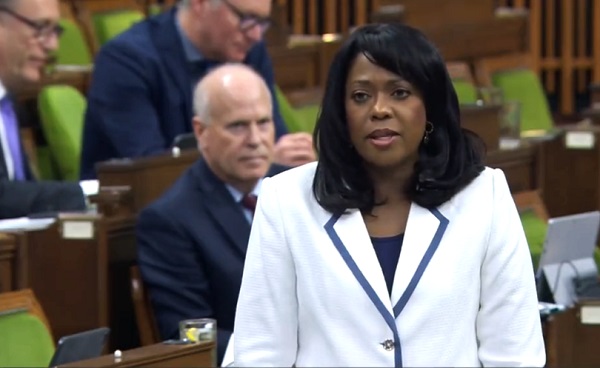Uncategorized
Conservative MP Leslyn Lewis calls out Liberals for not supporting anti-church burning bill

From LifeSiteNews
Speaking about the ‘hundreds of churches’ that have been ‘set on fire across Canada’ in the last number of years, Conservative MP Leslyn Lewis questioned why the Liberals seem completely unconcerned.
One of Canada’s most prominent pro-life MPs has called out the Trudeau government for its apparent lack of support for an anti-arson bill which aims to curb the rash of church burnings plaguing Christians in the country.
In an X post Monday, Conservative MP Leslyn Lewis pointed out that under the Liberal government of Prime Minister Justin Trudeau, church burnings have shot up “100 percent,” and that the government does not seem to have expressed any “concern” at all.
“In the last several years, hundreds of churches and other places of worship have been set on fire across Canada. Under this Liberal government, these crimes have increased by over 100%,” wrote Lewis on X.
“Where is the concern or action from the Liberals regarding these attacks on Christian churches?”
Lewis’s post included a link to another X post from Conservative MP Marc Dalton, who posted a video on October 31 highlighting the recent rash of church burnings and how his bill, C-411, aims to stop this.
“Thank you @MarcDalton for bringing forward Bill C-411, the Anti-Arson Act, an important bill to protect places of worship and increase penalties on those who would target them,” wrote Lewis.
Bill C-411, or, An Act to amend the Criminal Code (arson — wildfires and places of worship), was introduced by Dalton in June.
The law, if passed, would create specific criminal offenses for setting fires to churches and for starting wildfires.
Dalton said in his video that there is a “serious problem in Canada that must be addressed” concerning Catholic and Christian churches being the target of arson.
He highlighted how since 2010, 592 churches have been the target of arson in Canada, with a large portion of these being concentrated to the last few years.
Dalton noted how Canada’s Criminal Code, as it stands, does not include specific protections against arson directed at religious institutions. C-411 aims to “change that,” said Dalton, noting that the bill would implement a minimum sentence of five years in jail for a first offense of this kind, and seven years for a repeat offense.
“This bill strengthens our criminal code and punishes these hateful arson attacks,” he said.
“Commonsense Conservatives stand for strict punishments against criminals who target places of worship.”
Since the spring of 2021, 112 churches, most of them Catholic, have been burned to the ground, vandalized or defiled in Canada.
The church burnings started in earnest after the mainstream media and the federal government ran with inflammatory and dubious claims that hundreds of children were buried and disregarded by Catholic priests and nuns who ran some of the now-closed residential schools in Canada, particularly a school in Kamloops, British Columbia.
The anti-Catholic narrative that developed following these claims continues to this day, despite the fact that no bodies have actually been discovered.
Uncategorized
Cost of bureaucracy balloons 80 per cent in 10 years: Public Accounts

The cost of the bureaucracy increased by $6 billion last year, according to newly released numbers in Public Accounts disclosures. The Canadian Taxpayers Federation is calling on Prime Minister Mark Carney to immediately shrink the bureaucracy.
“The Public Accounts show the cost of the federal bureaucracy is out of control,” said Franco Terrazzano, CTF Federal Director. “Tinkering around the edges won’t cut it, Carney needs to take urgent action to shrink the bloated federal bureaucracy.”
The federal bureaucracy cost taxpayers $71.4 billion in 2024-25, according to the Public Accounts. The cost of the federal bureaucracy increased by $6 billion, or more than nine per cent, over the last year.
The federal bureaucracy cost taxpayers $39.6 billion in 2015-16, according to the Public Accounts. That means the cost of the federal bureaucracy increased 80 per cent over the last 10 years. The government added 99,000 extra bureaucrats between 2015-16 and 2024-25.
Half of Canadians say federal services have gotten worse since 2016, despite the massive increase in the federal bureaucracy, according to a Leger poll.
Not only has the size of the bureaucracy increased, the cost of consultants, contractors and outsourcing has increased as well. The government spent $23.1 billion on “professional and special services” last year, according to the Public Accounts. That’s an 11 per cent increase over the previous year. The government’s spending on professional and special services more than doubled since 2015-16.
“Taxpayers should not be paying way more for in-house government bureaucrats and way more for outside help,” Terrazzano said. “Mere promises to find minor savings in the federal bureaucracy won’t fix Canada’s finances.
“Taxpayers need Carney to take urgent action and significantly cut the number of bureaucrats now.”
Table: Cost of bureaucracy and professional and special services, Public Accounts
| Year | Bureaucracy | Professional and special services |
|
$71,369,677,000 |
$23,145,218,000 |
|
|
$65,326,643,000 |
$20,771,477,000 |
|
|
$56,467,851,000 |
$18,591,373,000 |
|
|
$60,676,243,000 |
$17,511,078,000 |
|
|
$52,984,272,000 |
$14,720,455,000 |
|
|
$46,349,166,000 |
$13,334,341,000 |
|
|
$46,131,628,000 |
$12,940,395,000 |
|
|
$45,262,821,000 |
$12,950,619,000 |
|
|
$38,909,594,000 |
$11,910,257,000 |
|
|
$39,616,656,000 |
$11,082,974,000 |
Uncategorized
Trump Admin Establishing Council To Make Buildings Beautiful Again


From the Daily Caller News Foundation
By Jason Hopkins
The Trump administration is creating a first-of-its-kind task force aimed at ushering in a new “Golden Age” of beautiful infrastructure across the U.S.
The Department of Transportation (DOT) will announce the establishment of the Beautifying Transportation Infrastructure Council (BTIC) on Thursday, the Daily Caller News Foundation exclusively learned. The BTIC seeks to advise Transportation Secretary Sean Duffy on design and policy ideas for key infrastructure projects, including highways, bridges and transit hubs.
“What happened to our country’s proud tradition of building great, big, beautiful things?” Duffy said in a statement shared with the DCNF. “It’s time the design for America’s latest infrastructure projects reflects our nation’s strength, pride, and promise.”
“We’re engaging the best and brightest minds in architectural design and engineering to make beautiful structures that move you and bring about a new Golden Age of Transportation,” Duffy continued.
Mini scoop – here is the DOT’s rollout of its Beautifying Transportation Infrastructure Council, which will be tasked with making our buildings beautiful again. pic.twitter.com/
9iV2xSxdJM — Jason Hopkins (@jasonhopkinsdc) October 23, 2025
The DOT is encouraging nominations of the country’s best architects, urban planners, artists and others to serve on the council, according to the department. While ensuring that efficiency and safety remain a top priority, the BTIC will provide guidance on projects that “enhance” public areas and develop aesthetic performance metrics.
The new council aligns with an executive order signed by President Donald Trump in August 2025 regarding infrastructure. The “Making Federal Architecture Beautiful Again” order calls for federal public buildings in the country to “respect regional architectural heritage” and aims to prevent federal construction projects from using modernist and brutalist architecture styles, instead returning to a classical style.
“The Founders, in line with great societies before them, attached great importance to Federal civic architecture,” Trump’s order stated. “They wanted America’s public buildings to inspire the American people and encourage civic virtue.”
“President George Washington and Secretary of State Thomas Jefferson consciously modeled the most important buildings in Washington, D.C., on the classical architecture of ancient Athens and Rome,” the order continued. “Because of their proven ability to meet these requirements, classical and traditional architecture are preferred modes of architectural design.”
The DOT invested millions in major infrastructure projects since Trump’s return to the White House. Duffy announced in August a $43 million transformation initiative of the New York Penn Station in New York City and in September unveiledmajor progress in the rehabilitation and modernization of Washington Union Station in Washington, D.C.
The BTIC will comprise up to 11 members who will serve two-year terms, with the chance to be reappointed, according to the DOT. The task force will meet biannually. The deadline for nominations will end Nov. 21.
-

 Crime20 hours ago
Crime20 hours agoBrown University shooter dead of apparent self-inflicted gunshot wound
-

 Business1 day ago
Business1 day agoCanada Hits the Brakes on Population
-

 Crime2 days ago
Crime2 days agoBondi Beach Survivor Says Cops Prevented Her From Fighting Back Against Terrorists
-

 International2 days ago
International2 days agoHouse Rejects Bipartisan Attempt To Block Trump From Using Military Force Against Venezuela
-

 Automotive2 days ago
Automotive2 days agoFord’s EV Fiasco Fallout Hits Hard
-

 Frontier Centre for Public Policy1 day ago
Frontier Centre for Public Policy1 day agoCanada Lets Child-Porn Offenders Off Easy While Targeting Bible Believers
-

 Agriculture1 day ago
Agriculture1 day agoWhy is Canada paying for dairy ‘losses’ during a boom?
-

 COVID-192 days ago
COVID-192 days agoChina Retaliates Against Missouri With $50 Billion Lawsuit In Escalating Covid Battle










